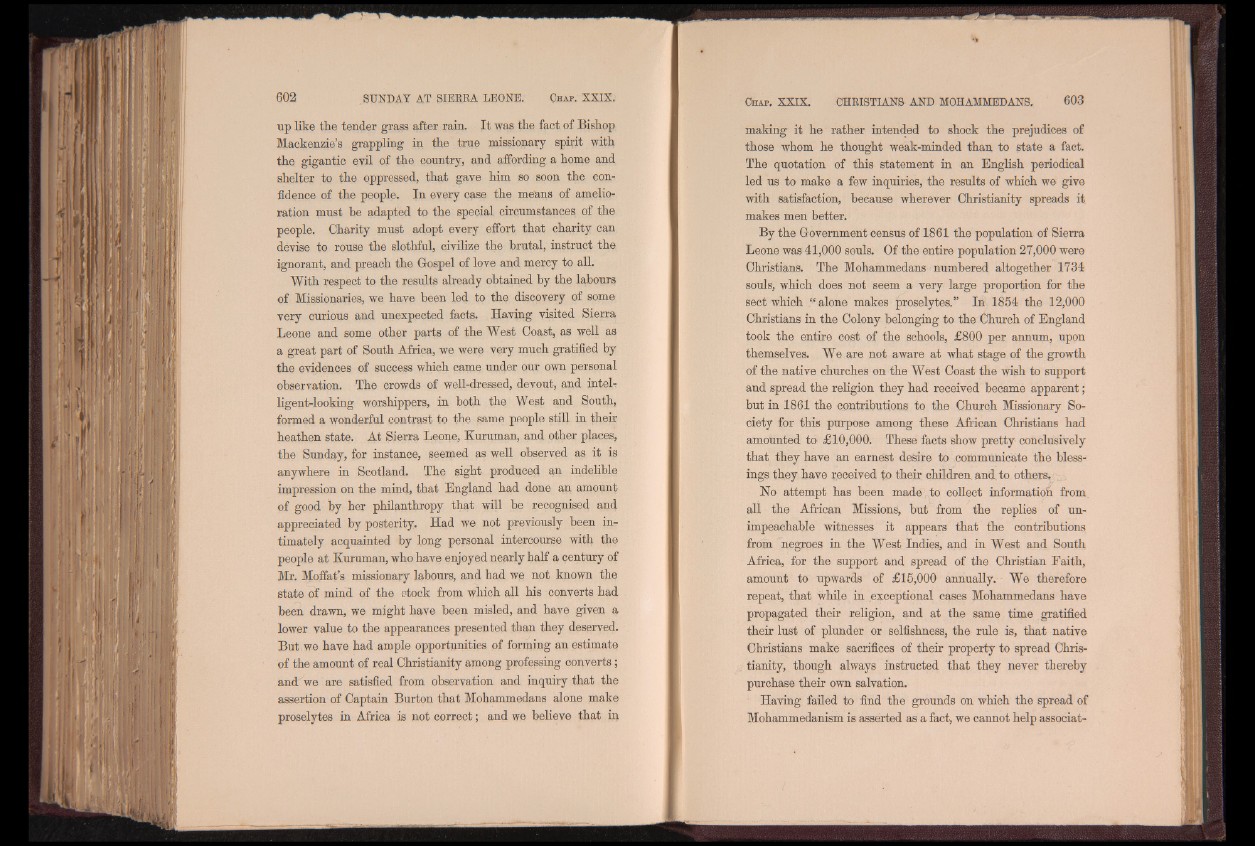
up like the tender grass after rain. I t was the fact of Bishop
Mackenzie’s grappling in the true missionary spirit with
the gigantic evil of the country, and affording a home and
shelter to the oppressed, that gave him so soon the confidence
of the people. In every case the means of amelioration
must be adapted to the special circumstances of the
people. Charity must adopt every effort that charity can
devise to rouse the slothful, civilize the brutal, instruct the
ignorant, and preach the Gospel of love and mercy to all.
With respect to the results already obtained by the labours
of Missionaries, we have been led to the discovery of some
very curious and unexpected facts. Having visited Sierra
Leone and some other parts of the West Coast, as well as
a great part of South Africa, we were very much gratified by
the evidences of success which came under our own personal
observation. The crowds of well-dressed, devout, and intel-
ligent-looking worshippers, in both the West and South,
formed a wonderful contrast to the same people still in their
heathen state. At Sierra Leone, Kuruman, and other places,
the Sunday, for instance, seemed as well observed as it is
anywhere in Scotland. The sight produced an indelible
impression on the mind, that England had done an amount
of good by ber philanthropy that will be recognised and
appreciated by posterity. Had we not previously been intimately
acquainted by long personal intercourse with tbe
people at Kuruman, who have enjoyed nearly half a century of
Mr. Moffat’s missionary labours, and bad we not known tbe
state of mind of tbe stock from which all his converts had
been drawn, we might have been misled, and have given a
lower value to tbe appearances presented than they deserved.
But we have had ample opportunities of forming an estimate
of the amount of real Christianity among professing converts;
and we are satisfied from observation and inquiry that tbe
assertion of Captain Burton that Mohammedans alone make
proselytes in Africa is not correct; and we believe that in
making it he rather intended to shock the prejudices of
those whom he thought weak-minded than to state a fact.
The quotation of this statement in an English periodical
led us to make a few inquiries, the results of which we give
with satisfaction, because wherever Christianity spreads it
makes men better.
By the Government census of 1861 the population of Sierra
Leone was 41,000 souls. Of the entire population 27,000 were
Christians. The Mohammedans numbered altogether 1734
souls, which does not seem a very large proportion for the
sect which “ alone makes proselytes.” In 1854 the 12,000
Christians in the Colony belonging to the Church of England
took the entire cost of the schools, £800 per annum, upon
themselves. We are not aware at what stage of the growth
of the native churches on the West Coast the wish to support
and spread the religion they had received became apparent;
but in 1861 the contributions to the Church Missionary Society
for this purpose among these African Christians had
amounted to £10,000. These facts show pretty conclusively
that they have an earnest desire to communicate the blessings
they have received to their children, and. to others.
No attempt has been made to collect informatiofi. from,
all the African Missions, but from the replies of unimpeachable
witnesses it appears that the contributions
from negroes in the West Indies, and in West and South
Africa, for the support and spread of the Christian Faith,
amount to upwards of £15,000 annually. We therefore
repeat, that while in exceptional cases Mohammedans have
propagated their religion, and at the same time gratified
their lust of plunder or selfishness, the rule is, that native
Christians make sacrifices of their property to spread Christianity,
though always instructed that they never thereby
purchase their own salvation.
Having failed to find the grounds on which the spread of
Mohammedanism is asserted as a fact, we cannot help associat